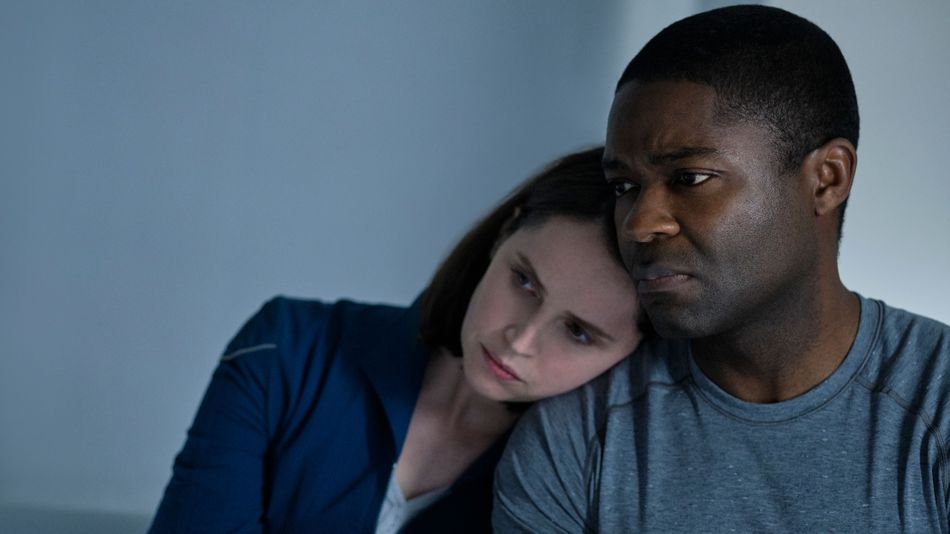Here’s a little spoiler that will help The Midnight Sky go down easier: The only real mystery is that there is no mystery.
It’s not for lack of trying. Throughout most of its two-hour running time, this absolute downer of a sci-fi drama directed by George Clooney (who also stars) and written by Mark L. Smith (The Revenant) acts like it’s trying to keep you guessing. Maybe something’s been lost in translation, as the story is adapted from Lily Brooks-Dalton’s 2016 novel, Good Morning, Midnight.
We open on Clooney’s Augustine, a frail, old man with a giant bushy beard that would make Santa Claus jealous and a terminal condition that demands regular treatments. On-screen text reveals we’re three weeks removed from “the event,” which we quickly come to understand is some unspecified cataclysm that has rendered the Earth’s surface uninhabitable.
Meanwhile, Augustine — a highly reputable space scientist — has stuck around in a remote arctic outpost where the air is still relatively safe. He’s there to maintain contact with ongoing deep space missions that haven’t come back yet and is primed for a solitary post-apocalypse until he discovers a preteen stowaway named Iris (Caoilinn Springall).
Meanwhile, across the solar system, the crew of Project Aether is headed home after a successful mission to find a habitable world in a previously uncharted moon of Jupiter. The five astronauts — Sully (Felicity Jones), Commander Gordon “Ade” Adewole (David Oyelowo), Maya (Tiffany Boone), Sanchez (Demián Bichir), and Mitchell (Kyle Chandler) — are excited to get back to their lives after two years away, not realizing the travesty that has befallen Earth.
The only real mystery is that there is no mystery.
The Midnight Sky leaps back and forth between the two groups, slowly filling in the margins of what happened and how dire things are with vague details. Really, the specifics aren’t supposed to matter. But the pace and rhythm of the unfolding story suggests otherwise, building up the details as some kind of mystery where the big reveal is delayed again and again by a growing set of unfortunate circumstances.
First, it’s Augustine just not being able to make contact. He soon realizes it’s because of his arctic station’s underpowered comms dish. There’s another, more powerful dish that’s close enough to reach on the back of a snowmobile, but his deteriorating condition and Iris both complicate any sort of journey.
When Augustine does finally work out a way to make contact, calamity strikes in space. The Project Aether ship runs into a dangerous ice field along the way, and an unfortunately timed impact blasts away the vessel’s comms dish right at the moment that Augustine starts explaining what happened.
This painfully drawn out series of fake-outs goes on for a good 90 minutes, and so The Midnight Sky‘s de facto focus becomes the mystery. What does Augustine know about Earth’s plight? What’s his personal connection to the crew of Project Aether? What’s with the flashback looks at his past? And how does Iris even factor into all of this?
Only a few of these questions are even answered explicitly, during the final half-hour, and none of the answers are surprising if you were paying attention. The fake-outs fill empty minutes with dramatic tension, but they mostly serve to pad out a running time that’s already weighed down by glacially paced scenes and a melodramatic musical score that goes hard on mournful piano-and-strings numbers.
It’s a shame things never come together, especially with such a stacked cast. Clooney’s status as a generational talent is well-established at this point, and he certainly does act his ass off. Iris, who is mute for reasons you’re only ever meant to guess at, gives Clooney an emotional anchor for his performance and little else.

Image: Philippe Antonello/NETFLIX
The Project Aether crew has more to work with as we enter their midst toward the end of a lengthy mission. Through their interactions we learn about their histories and come to understand, implicitly more than explicitly, the myriad ways the two-year journey has turned them into a tight-knit family.
Nowhere is this clearer than in the way the story tackles Sully’s pregnancy. There’s strong suggestion that Ade is the father (or at least the genetic donor). But there are close relationships throughout the crew, including an especially strong link between Sully and Maya. The idle patter between crewmates makes it clear that every member of Project Aether feels a sense of kinship with the unborn child, and enough agency to in her eventual existence to toss out names and generally act like nervous parents-to-be.
In the end, though, it’s all set dressing. Every single human you see in The Midnight Sky is doomed in one way or another, and whether they know it or not. If you can manage to look past the misguidedly central mystery, there’s the faintest hint of a thought-provoking journey here that ponders the impermanence of human existence and the shreds of meaning that emerge from the even the smallest choices we make for ourselves.
During that final half-hour where some is revealed and the mystery finally takes a back seat, you can almost glimpse the movie that might’ve been. It just never quite gets there. For all the noteworthy breadcrumbs we collect along the way and sturdy performances from a top-tier cast, the questionable commitment to keeping us guessing ultimately softens The Midnight Sky‘s heaviest emotional punch.
The Midnight Sky is now streaming on Netflix.
